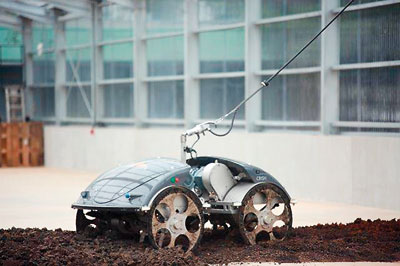MAS transforms sludge to usable bricks
View(s):
CRISH, a fully automated robot which turns and mixes the sludge in the 10,000 square foot area.
Companies that depend on water for their operations such as MAS Holdings also recognise that the responsible use of water is a key business issue. ”As a key consumer of dyes and colours, the apparel and fabrics industry also uses significant amounts of water while using these products to process its yarn and fabrics,” the company said in a media release. In 2011 MAS began extensive research and development to create a long term solution for the problem of ETP Sludge with the ‘Great Brick’ project at the MAS Fabric Park in Thulhiriya which has become one of the group’s most sustainable initiatives towards zero landfill.
After months of intense R&D the teams achieved a breakthrough which turned ETP sludge into eco bricks. Since then MFP has perfected the process and has converted all its sludge to thousands of bricks. In 2015 the zone turned all of its 600 tonnes of ETP sludge into 70,000 bricks, tiles and grills that have been used by the group for the landscaping of its own facilities, the release said. In 2015 MAS expanded the project to the Biyagama Industrial Zone with the construction of a Solar Sludge Dryer that will take its water commitments to new heights.
The facility will help dry the 1,600 tonnes of wet sludge MAS produces in Biyagama each year. The operation is 95 per cent dependent on the heat of the sun with solar radiation used to evaporate the unwanted water fraction. The state of the art Green House facility has the ability to harness more than 1.6 Million Kwh of free energy annually via solar radiation. Misver Deane – CEO, MAS Fabric Park, notes: “We want to stop the malpractice of dumping ETP sludge. The harm done by effluent waste seeping into our groundwater is a national problem and threatens future water resources.
If we create excitement about this solution we hope more companies will follow and a national policy on the management of ETP sludge will take effect”. “MAS has picked its battles well in the war to protect critical ecological resources.” says Sarinda Unamboowe the group’s Board Director directly overseeing Sustainability “Water is simply just one of them and the commitment to protect, preserve and finally create a positive impact is practiced almost religiously inside. Now it’s simply time to start telling the stories and sharing the lessons learnt. We hope it inspires more to create their own pathway to responsible leadership.”


